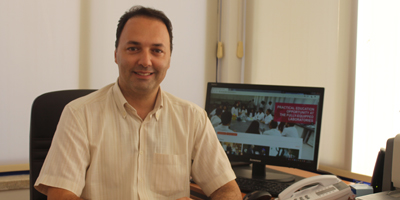EUL Academician Evre addressed the Opportunities offered by Crises and Public Administration Reform

Crises can be transformed into opportunities by political leaders who can adopt reforms
Head of European University of Lefke (EUL) Department of Public Administration Assoc. Prof. Dr. Bülent Evre conveyed detailed information on opportunities offered by crises and public administration reform.
Evre said that, both developed and developing countries have carried out many reforms in the field of public administration since the 1980s in order to overcome the problems they faced and to offer more qualified services to their citizens.
Economic, financial and social crises play a triggering role in initiating reform processes
Evre pointed out that there are many reasons for the search for restructuring the structures and added that processes in the public sector and added that economic, financial and social crises play a triggering role in initiating reform processes. He also said that, “When we look at the reforms in the world, we see that the governments faced serious crises just before”. Pointing out that developing countries have been successful in the reforms of the public sector since the 1980s, Evre exemplified high inflation, domestic and foreign debt, low savings and investment problems of African and Latin American countries and added that in 1997, Asian countries such as Indonesia, South Korea and Malaysia faced economic and financial crisis and entered into a major reform effort in the public sector.
The need for reform is also on the agenda of developed countries
Evre stated that, Albania, Bulgaria and Bolivia, in the field of human resources management; Russia, India and Tanzania in organizational terms; India, Tanzania and Uganda on the quality of public services and Ethiopia, Russia and Yemen have carried out successful reforms in the in-service training of public employees. Pointing out that the need for reform is not only a problem of developing countries, but also an issue on the agenda of developed countries, Evra stated that the reform efforts, which started in the 1980s, pushed developing countries to reform the public administration after the financial crisis in 2008. He said that, “For example, when we look at Europe, the UK and Ireland turn to comprehensive and systematic structural reforms to tackle the financial crisis, while Iceland, Lithuania, Hungary and Slovenia were only able to achieve a few structural reforms which were far from being unified”, and added that after the banking crisis in Southern Cyprus in 2013, the they received assistance from the IMF and the European Central Bank and adopted a series of structural measures.
Evre said that, “In this concept, crises can be transformed into opportunities by political leaders who can adopt reforms” and added that as a result of the 2018 Turkey’s currency and debt crisis, T.R.N.C which uses the same currency should take comprehensive and systematic measures, due to the experienced inflation. Evre finally stated that, “Within this framework, we are going through a critical period in which we can implement the structural reforms in order to ensure discipline in public financial management, increase the efficiency of public administration, and improve the quality of public services such as e-government”.
